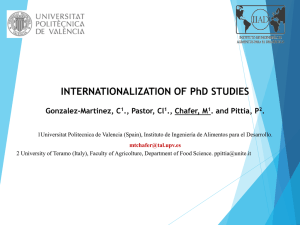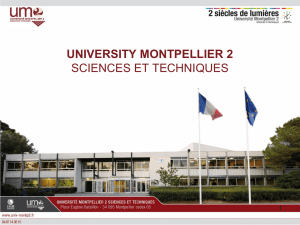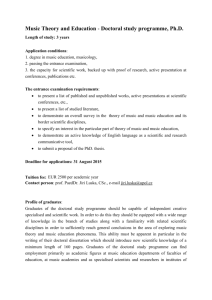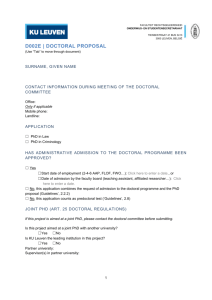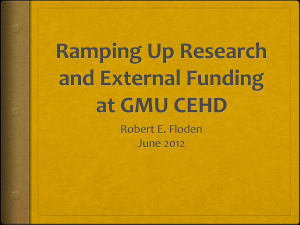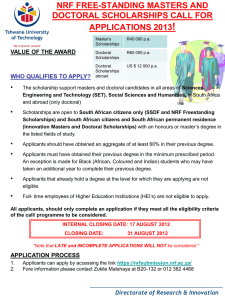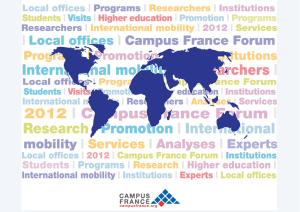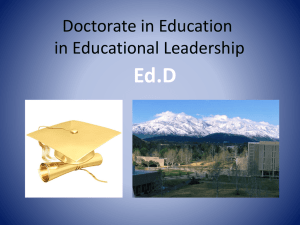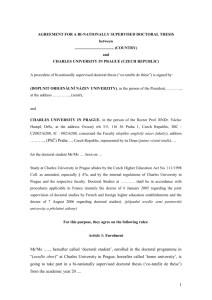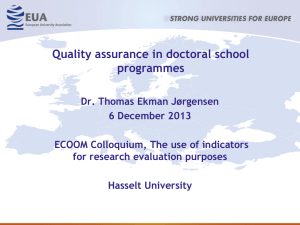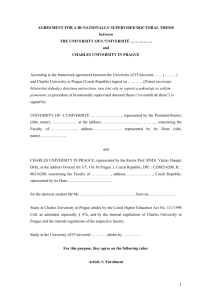Jenny Phelps - Canadian Association for Graduate Studies
advertisement
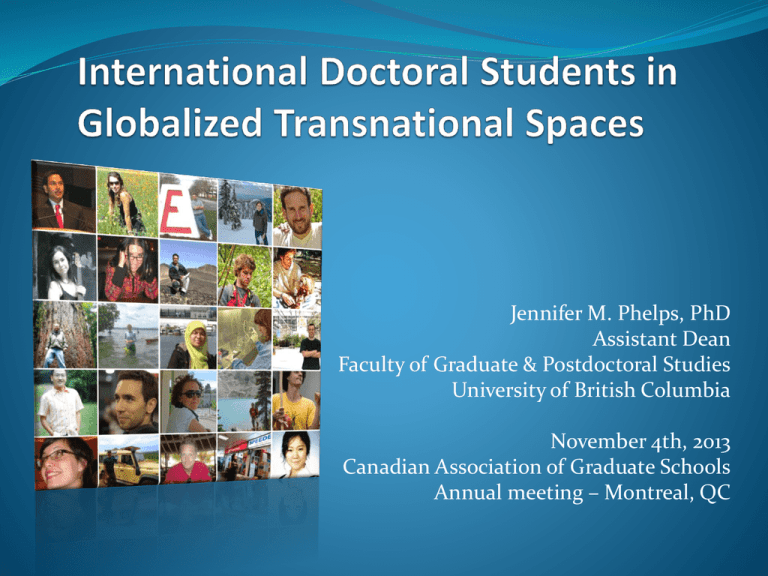
Jennifer M. Phelps, PhD Assistant Dean Faculty of Graduate & Postdoctoral Studies University of British Columbia November 4th, 2013 Canadian Association of Graduate Schools Annual meeting – Montreal, QC Research problem We know little about how international doctoral students make sense of their own educational purposes, choices and experiences, and imagine their future trajectories in the context of a rapidly globalizing world. Research questions 1. What are international doctoral students’ purposes in pursuing a PhD abroad? 2. Why and how did these students come to the University of British Columbia, Canada? What do they encounter? What future paths do they imagine? 3. What do the answers to these questions tell us about influences of globalization and how students are interacting with them? Global Higher Education Field Network Society Global Social Imaginary (Castels, 1996) Global ranking schemes; vying for global prestige Increased Student/ Academic Mobility (Appadurai, 1996; Taylor,2004) Global Universities Transnational Space (Glick Schiller & Fouron, 1999; Jackson, Crang & Dwyer, 2004) Research globalization Academic capitalism/ market imperatives Neoliberalism (Harvey, 2005) Global Higher Education Field National and Provincial Policies and Discourses University Policies and Discourses Doctoral education as Doctoral education as means to produce/retain Student developing “global citizens”, capital (human, economic)purposes?“outstanding researchers” and contributors to social good Research design and method Qualitative methodology– in-depth interviews with representative sample of international PhD students at UBC who had advanced to candidacy Sampling frame Asia SSH M F Arvind Maya Middle East M F Sheddy USA M F M Jason Mallory Carl Ross Suzanne Shane Jun Li Farjad Hoda Christopher Jackie Jaro Quon Tina Ira Jerry Rico Ravi Central/South America European Union Kim F M F Diego Chela Helena Giulia Esteban Stefan Reza STEM Simon Totals 6 3 3 1 4 4 SSH: 10 (32.3%) (UBC: 30.4%) STEM: 21 (67.7%) (UBC: 69.6%) 5 2 2 1 Female: 11 (35.5%) (UBC: 37.9%) Male: 20 (64.5%) (UBC: 62.1%) Total: 31 Findings Map CROSS-CUTTING THEMES STUDENT PATHWAY Imagining and choosing an educational path Living and learning as international doctoral students Imagined and planned futures Students’ purposes Influences of for doctoral globalization on education students’ imagination, choices, experiences Student agency and its bounds Students’ purposes for doctoral education 1) Capital acquisition - Prestige/clout/credibility - Skills/knowledge/English proficiency - Access to influential social/professional networks - Mobility (Motility capital--Kaufmann, Bergman & Joye, 2004) – ability to be mobile; to immigrate - Intercultural fluency (Transnational identity capital--Kim, 2010) – ability to engage competently with ‘otherness’ Students’ purposes for doctoral education 2) Academic Produce and disseminate knowledge; teach new learners; become members of an academic community “The most interesting, most exciting in doing research is I am the first person to see this, to discover this. I think discovery, the knowledge itself is very important because the application is based on fundamental study…Maybe for 10 years nobody use it, but discovery, the knowledge itself is interesting process for me.” (Jun) Students’ purposes for doctoral education 3) Positive social contribution Effect positive social change; help others; benefit home country “I think I will be able to do much more back home than here. Here you have already so many people with PhD and so many intelligent people...I think we need more people willing to work back home rather than run away after they get a PhD... I learned a lot, but all of them would mean nothing if I don’t know how to use them for the benefit of others.” (Sheddy) Students’ purposes for doctoral education 4) Personal Experience the world and find personal growth, enjoy life, prove oneself, give family new opportunities. “My decision doing a PhD was not based on I want to be a PhD. It was based on I want to have more Canadian experience...So PhD doesn't really mean that much to me. My experience, interacting with the real Canadian environment, that means a lot to me.”(Li) “I wanted to do it for personal reasons more so. I wasn’t thinking about getting a job after, I just wanted to see if I could actually do a PhD…Coming from a lower class background, I’m not somebody who should be doing a PhD. I should be working as a mechanic or in some sort of trade. I suppose it was kind of sticking two fingers up to the world.” (Shane) Influences of globalization across the student pathway 1) Choosing a path Global media influences students’ imaginations Mobility of others (family, other students, faculty members) makes global pathways seem accessible Global educational rankings and scholarship schemes simplify complex choices “I was ten years old and there were Olympic games in Calgary (on TV). And we were still behind the Iron Curtain and I had no idea what it is…I knew that I wanted to go to at least see Canada. Canada, in my child eyes, was something that perfectly fulfilled my wishes which was lots of snow, freedom, maybe I don’t know, nice life.” (Jaro) Influences of globalization across the student pathway 2) Being an international doctoral student Significant engagement in global academic mobility and research collaboration Enduring and shifting identities and senses of “home” --Immigration to Canada is an evolving issue for many Pervasive use of communication technologies allow students to be both “here” and “there” simultaneously “I had never imagined myself living anywhere else [but home country]...but for my daughter, this is the only home she has known. And that does cause some anxiety, because when I say home, it’s always [home country], but she always refers to Vancouver as home.” (Maya) Influences of globalization across the student pathway 3) Imagined Global “canvas of the possible”, some expect to stay and planned mobile for a period after obtaining PhD futures Some seek stability but expect ‘forced mobility’ due to discouraging job market Some imagine new career forms, mixing sectors and building on global networks Those returning to less developed countries want to retain connections to academic mainstream “I wish that UBC can do something where we can still be connected to Canada. I mean you cannot expect for all the people to just come and settle here. You still need that other part of the world and you still need to have ties with it, but I’m not sure what can be done so that we can.” (Hoda) Findings – Agency and its bounds Agency Bounds Choosing a path Students imagine and create global educational pathways Some pathways are blocked by political, financial concerns, informational deficits Being an international doctoral student Imagined and planned futures Students pursue and create a wide variety of learning opportunities Funding constraints, exploitive supervisors, inflexible degree structures restrict personal agency Compressed job markets, family obligations restrict agency for many For some, the world seems open and a variety of imagined careers are for the making Global Higher Education Field National and Provincial Policies and Discourses “World-making agents” University Policies and Discourses Rizvi & Lingard, 2009 International Doctoral Students are deeply influenced by forces of globalization yet navigate them with agency and strategy within their unique ranges of motion. They offer a multiplicity of purposes and experiences that counter any singular notion of the “international doctoral student”. Implications for policy and practice Better alignment is needed between doctoral education and diverse, global career paths Students seek a larger purpose to their doctoral education and want to make a positive social contribution More can be done to bridge the distances between global academic mainstream and periphery and extend the benefits of doctoral education Universities can better support students by recognizing their agency and the multiplicity of their purposes, experiences and identities Thank you. Merci. jenny.phelps@ubc.ca
